
Antoine Dominique Domino Jr., known as Fats Domino, was an American singer-songwriter and pianist. One of the pioneers of rock and roll music, Domino sold more than 65 million records. Born in New Orleans to a French Creole family, Domino signed to Imperial Records in 1949. His first single "The Fat Man" is cited by some historians as the first rock and roll single and the first to sell more than 1 million copies. Domino continued to work with the song's co-writer Dave Bartholomew, contributing his distinctive rolling piano style to Lloyd Price's "Lawdy Miss Clawdy" (1952) and scoring a string of mainstream hits beginning with "Ain't That a Shame" (1955). Between 1955 and 1960, he had eleven Top 10 US pop hits. By 1955, five of his records had sold more than a million copies, being certified gold.

Earl Cyril Palmer was an American drummer. Considered one of the inventors of rock and roll, he is a member of the Rock and Roll Hall of Fame.

New Orleans rhythm and blues is a style of rhythm and blues that originated in New Orleans. It was a direct precursor to rock and roll and strongly influenced ska. Instrumentation typically includes drums, bass, piano, horns, electric guitar, and vocals. The style is characterized by syncopated "second line" rhythms, a strong backbeat, and soulful vocals. Artists such as Roy Brown, Dave Bartholomew, and Fats Domino are representative of the New Orleans R&B sound.
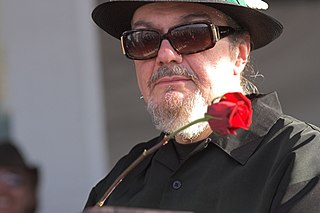
Malcolm John Rebennack, Jr., better known by his stage name Dr. John, was an American singer and songwriter. His music combined New Orleans blues, jazz, R&B, soul and funk.

Marcia Ball is an American blues singer and pianist raised in Vinton, Louisiana.

David Louis Bartholomew was an American musician, bandleader, composer, arranger, and record producer. He was prominent in the music of New Orleans throughout the second half of the 20th century. Originally a trumpeter, he was active in many musical genres, including rhythm and blues, big band, swing music, rock and roll, New Orleans jazz, and Dixieland. In his induction into the Rock and Roll Hall of Fame, he was cited as a key figure in the transition from jump blues and swing to R&B and as "one of the Crescent City's greatest musicians and a true pioneer in the rock and roll revolution".

Lee Francis Allen was an American tenor saxophone player. Phil Alvin, Allen's bandmate in The Blasters, called him one of the most important instrumentalists in rock'n'roll. Allen's distinctive tone has been hailed as "one of the defining sounds of rock'n'roll" and "one of the DNA strands of rock."
"Blue Monday" is a song written by Dave Bartholomew, first recorded in 1953 by Smiley Lewis and issued as a single, in January 1954, on Imperial Records. The single, with a slow-rocking beat, features an instrumental electric guitar solo by Lewis.
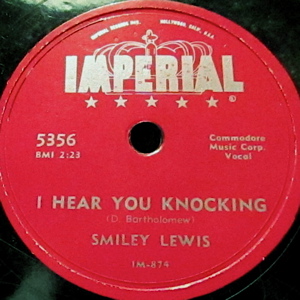
"I Hear You Knocking" is a rhythm and blues song written by American musician Dave Bartholomew. New Orleans rhythm and blues singer Smiley Lewis first recorded the song in 1955. The lyrics tell of the return of a former lover who is rebuffed.
Huey Pierce "Piano" Smith was an American R&B pianist and session musician whose sound was influential in the development of rock and roll.

Alvin Owen "Red" Tyler was an American R&B and neo-bop jazz saxophonist, composer and arranger, regarded as "one of the most important figures in New Orleans R&B".
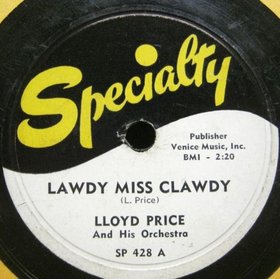
"Lawdy Miss Clawdy" is a song by New Orleans singer-songwriter Lloyd Price that "grandly introduced The New Orleans Sound". It was first recorded by Price in 1952 with Fats Domino and Dave Bartholomew during his first session for Art Rupe and Specialty Records. The song became one of the biggest selling R&B records of 1952 and crossed over to other audiences. "Lawdy Miss Clawdy" inspired many songs and has been recorded by a variety of artists.

Fast Track to Nowhere is the soundtrack album to the series Rebel Highway. Released in 1994, the album features contemporary artists covering classic songs from the 1950s.

Crawfish Fiesta is an album by Professor Longhair, released in 1980 by Alligator Records. It features Dr. John, who reprised his original role as guitarist in Longhair's band, Johnny Vidacovich on drums, Tony Dagradi and Andrew Kaslow on sax, and Longhair's long time conga player Alfred "Uganda" Roberts. The album was recorded at the Sea-Saint Studios in New Orleans and it was co-produced by Kaslow, his wife Allison and Bruce Iglauer. It won the first W.C. Handy Blues Album of the Year award in 1980.
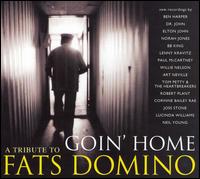
Goin' Home: A Tribute to Fats Domino is a 2007 tribute album by various artists to Fats Domino, issued by Vanguard Records.

Tango Palace is an album by the New Orleans singer and pianist Dr. John. It was his second and last album recorded for jazz label Horizon Records. It also marked the second album on which he collaborated with Doc Pomus on a few songs.
"Whole Lotta Lovin'" is a 1958 song by Fats Domino, written by Domino and Dave Bartholomew.
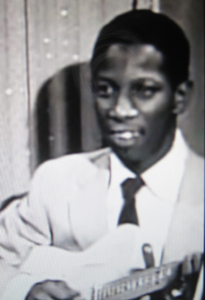
Walter Charles Nelson Jr., known as Walter "Papoose" Nelson, was an American R&B guitarist, best known for playing with Fats Domino, and on many of his hit records.
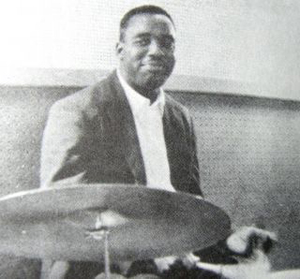
Charles "Hungry" Williams was an American rhythm & blues drummer, best known for the innovative and influential technique he used on numerous recordings that came out of New Orleans in the 1950s and 1960s.

Cornelius Jessie Coleman, also called "Tenoo", was an American R&B drummer best known for playing with Fats Domino's band and on many of his hit records.

















